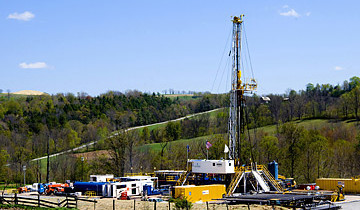North American firms quit shale gas fracking in Poland
Talisman Energy of Canada and the US oil company Marathon said they were pulling out of what is seen as potentially one of the largest sources of shale gas in Europe.Marathon said it decision was based on “unsuccessful attempts to find commercial levels of hydrocarbons”.
Poland had hoped the shale gas deposits would replace imports from Russia.
The departure of the two companies represents a major blow to the country’s ambitions.
“Poland’s shale gas exists only in the media, because in reality nothing happens,” said Grzegorz Pytel, energy expert at Sobieski Institute, a Polish think tank.
Talisman said it was selling its Polish operations to the Irish group San Leon Energy.
Oisin Fanning, executive chairman at San Leon Energy said: “There is still significant and continued industry interest in the Baltic Basin shale gas play, and we expect the results of our fracking programme to attract further interest from potential farm-in partners.”
Disappointing results
Of the world’s major energy companies, Chevron of the United States and Italy’s ENI are still active in Poland’s shale gas sector. The US giant Exxon pulled out last year, after disappointing drilling results.
More than 100 shale gas exploration licences have been issued by the government in Warsaw and over 40 test wells have been drilled. But few expect any to start producing gas before 2015 at the earliest.
Excitement over the potential for a Polish shale gas fracking bonanza reached its height two years ago, on the back of a report by the US Energy Information Administration which estimated reserves at 5.3 trillion cubic metres, enough to cover domestic demand for 300 years.
Cold water was poured on that last year, by the Polish government itself. The original estimate was slashed by almost 90% last year, to a figure that would still be enough to supply Poland with gas for decades, rather than centuries.
Politics over business
The reluctance of firms like Talisman and Marathon has placed a question mark over the commercial viability of the estimated reserves.
Because of this, the biggest holders of shale gas concession in Poland are companies controlled by the state, notably the energy group PGNIG.
Because the government is so enthusiastic about shale gas fracking and the potential freedom from Russian imports that it might bring, some of the state-controlled companies involved in the sector are not traditionally associated with energy exploration, including the oil refiner PKN Orlen and the copper miner KGHM.
This has prompted concerns from some minority shareholders in these companies that the government is placing political desire ahead of business knowledge.
Meanwhile, companies complain of entangled environmental red tape and a lack of a tax law relating to shale gas, which makes business planning problematic.
Fracking, which is basically fracturing layers of rock far below the earth’s surface in an effort to to get the gas and oil locked up in them, has attracted much controversy in recent years.
Proponents claim the industry could unlock vast new amounts of previously inaccessible reserves. Opponents say the environmental impacts, such as the contamination of ground water, are potentially devastating.
So far, local reaction in Poland has been subdued to the infant shale gas industry. But international environmental groups are building up their presence in the country and have started to take a close look at the fracking that’s already going on.
Fonte: bbc.co.uk



